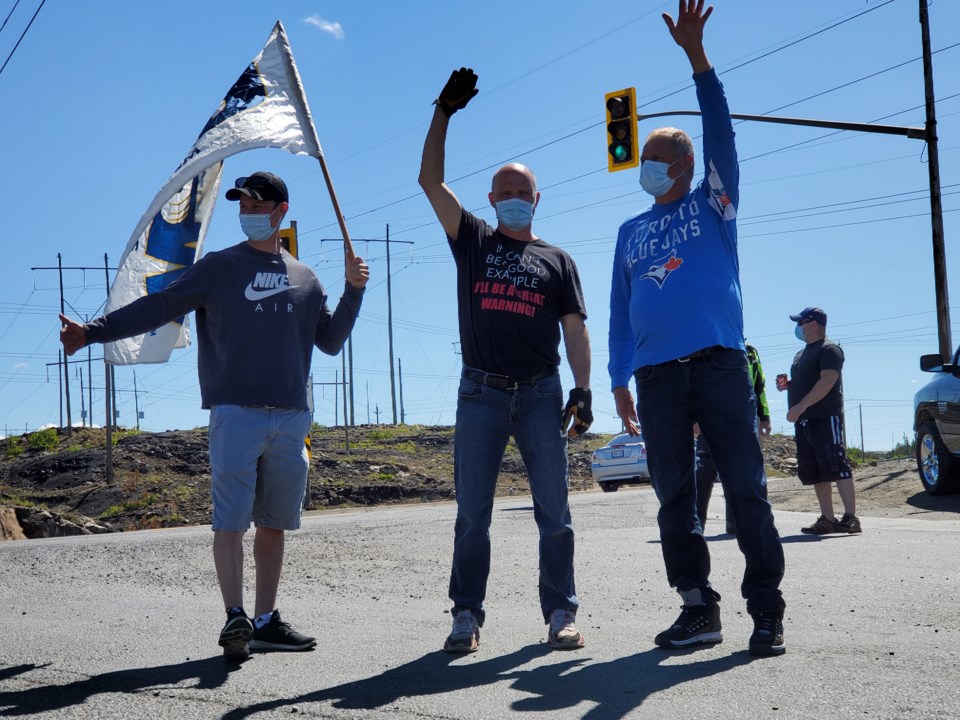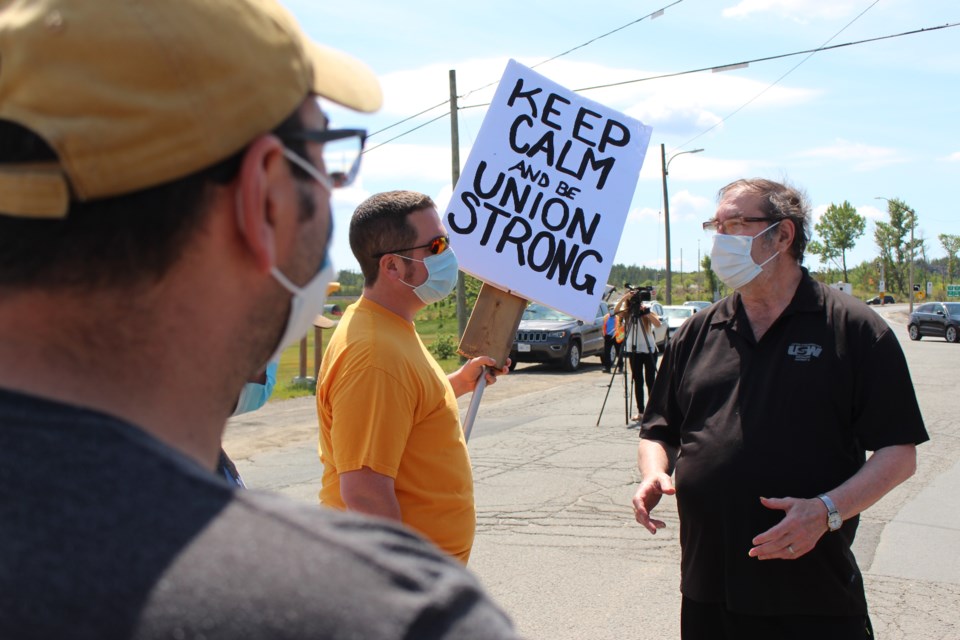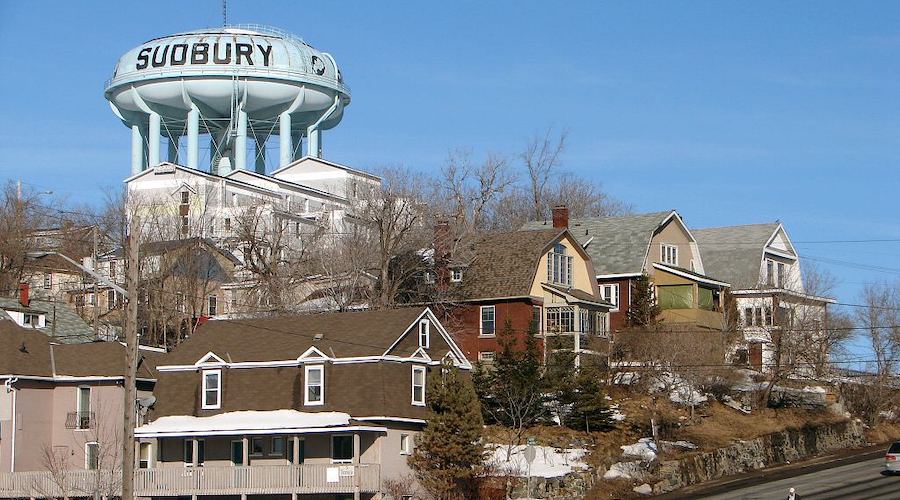VALE SUDBURY
Strike is over: Local 6500 members vote 85% to ratify new deal

Steelworkers Local 6500 members voted 85 per cent in favour of a new deal with Vale, ending a strike that began June 1.
Vale announced the deal on its website late last night. Local 6500 members reviewed the deal yesterday and voted last night on whether to accept it.
The new agreement takes effect immediately.
Dino Otranto, Vale’s chief operating officer for its North Atlantic Operations, said the company was pleased an agreement had been reached.
"The past two months have been challenging for everyone," Otranto said in a news release. "We are pleased that the company and the union were able to find common ground and a path forward. We look forward to welcoming everyone. Our task now is to position our business to thrive today and for generations to come. We have many opportunities ahead of us, with the growing electric vehicle market.
“The nickel, copper and cobalt we produce are critical metals to achieving a low carbon future. What we produce, and how we produce it, matters and our collective success going forward will require collaboration to make this business successful for us all. I’m confident that together, we will find our way."
The company said employees return to work the week of Aug. 9, with production ramping up in the weeks ahead.
The agreement ensures wage increases of six per cent over five years and maintains post-retirement benefits for new hires, one of the key sticking points that led to the strike.
The new five-year tentative agreement comes with a $2,500 recognition payment in recognition for efforts during the pandemic, to be paid this month.
It also comes with a $3,500 signing bonus, to be paid in September.
Wages will increase by a minimum of six per cent over the five year contract, with 1.5 per cent in the first year, plus an 82-cent cost-of-living allowance. Wages will increase by one per cent plus a 41-cent cost-of-living allowance in the second year, another one per cent plus a 41-cent cost-of-living allowance in the third year, another one per cent plus a 41-cent cost-of-living allowance in the fourth year, and another 1.5 per cent plus a 41-cent cost-of-living allowance in the fifth year.
Throughout the duration of the strike, many members said they were fighting for the future, as the Vale wanted to ax post-retirement benefits for all future hires. The union and the company have agreed to keep those benefits in place. Furthermore, over-the-counter drug coverage is being maintained.
The nearly 2,500 Local 6500 members hit the picket line June 1 after rejecting the first contract offer, which the union’s bargaining committee recommended workers accept. On June 14, members rejected a second contract offer.
In mid-July, a third-party facilitator was brought in to help with negotiations.
At the time, Local 6500 vice-president Kevin Boyd said the mood among the 2,500 members on the picket line is one of optimism on news negotiators had returned to the table.
“We could not have reached this settlement without your incredible support and principled stand you took throughout this difficult process,” said the bargaining committee in a message to members. We believe this tentative agreement is worthy of your USW Local 6500 solidarity and values, and we are unanimously recommending ratification.”
Local 6500 reveals highlights of new proposed 5-year deal

Wage increases of six per cent over five years and maintaining post-retirement benefits for new hires are among the highlights of a new tentative agreement reached by Vale and the striking United Steelworkers Local 6500.
In a message to its members, the union said after two weeks of challenging negotiations, a tentative agreement has been reached, one the bargaining team said includes significant monetary improvements for existing members and preserves retiree health benefits for all future hires.
The new five-year tentative agreement comes with a $2,500 recognition payment in recognition for efforts during the pandemic, to be paid this month.
It also comes with a $3,500 signing bonus, to be paid in September.
Wages will increase by a minimum of six per cent over the five year contract, with 1.5 per cent in the first year, plus an 82-cent cost-of-living allowance. Wages will increase by one per cent plus a 41-cent cost-of-living allowance in the second year, another one per cent plus a 41-cent cost-of-living allowance in the third year, another one per cent plus a 41-cent cost-of-living allowance in the fourth year, and another 1.5 per cent plus a 41-cent cost-of-living allowance in the fifth year.
Throughout the duration of the strike, many members said they were fighting for the future, as the Vale wanted to ax post-retirement benefits for all future hires. The union and the company have agreed to keep those benefits in place. Furthermore, over-the-counter drug coverage is being maintained.
Membership meetings are taking place today, and online voting will take place from 4-11 p.m.
The nearly 2,500 Local 6500 members hit the picket line June 1 after rejecting the first contract offer, which the union’s bargaining committee recommended workers accept. On June 14, members rejected a second contract offer.
In mid-July, a third-party facilitator was brought in to help with negotiations.
Local 6500 vice-president Kevin Boyd said the mood among the 2,500 members on the picket line is one of optimism on news negotiators had returned to the table.
“We could not have reached this settlement without your incredible support and principled stand you took throughout this difficult process,” said the bargaining committee in a message to members. :We believe this tentative agreement is worthy of your USW Local 6500 solidarity and values, and we are unanimously recommending ratification.”
In an email statement, Vale said the details of the agreement are being reviewed and voted on.
“We will have no further comment until such times as that occurs and the vote is complete,” said Vale spokesperson Danica Pagnutti.
We can confirm we have reached a tentative deal on a new five-year collective bargaining agreement with United Steelworkers (USW) Local 6500. Details of the tentative agreement are being shared directly with Local 6500 membership to review and vote on the offer on Tuesday. We will have no further comment until such time as that occurs and the vote is complete.
Vale warns Canada nickel ramp-up will stretch into next quarter

Sudbury, Ontario. Photo by P199, Wikimedia Commons.
Vale SA may have finally resolved a strike at its Sudbury complex, but don’t expect it to resume nickel and copper production anytime soon.

After a wage deal with workers ended the two-month stoppage, Vale outlined a return-to-production schedule that won’t see the Canadian facility fully up and running again until next quarter. Maintenance underway at the mines and plants will be completed, with the ramp-up beginning in September, the Rio de Janeiro-based company said Wednesday in an emailed response to questions.
While staff will return to work next week, the complex nature of restarting smelters and refineries may keep pressure on the metals markets. Sudbury is one of the few producers of nickel pellet, which is used to make alloys for the aerospace, electronic and nuclear industries. The disruption has driven consumers to tap battery-grade nickel briquette as an alternative, raising its premium and shortening inventories.
Vale is looking to steady its base metals ship after a poor performance last quarter that prompted the world’s largest commercial producer of nickel to discontinue annual production guidance. On a call with analysts last week, Chief Executive Officer Luciano Siani predicted a “challenging” third quarter at Sudbury even if the strike ended quickly.
Besides monetary sweeteners, the new contract preserves retiree health benefits for future hires as well as paying each worker a $3,500 signing bonus and $2,500 for their efforts in the pandemic.Post-retirement benefits had been a sticking point in the talks as Vale looks to contain costs and overhaul operations with an eye on the demanding battery market.
“We have many opportunities ahead of us, with the growing electric vehicle market,” Dino Otranto, chief operating officer of North Atlantic operations, said in a statement. “The nickel, copper and cobalt we produce are critical metals to achieving a low carbon future.”
(By Mariana Durao and James Attwood)



:no_upscale()/cdn.vox-cdn.com/uploads/chorus_image/image/69680770/gone_home_hero.0.jpg)

/cdn.vox-cdn.com/uploads/chorus_asset/file/7456055/gone_home.jpg)
/cdn.vox-cdn.com/uploads/chorus_asset/file/22762456/467522107.jpg)





